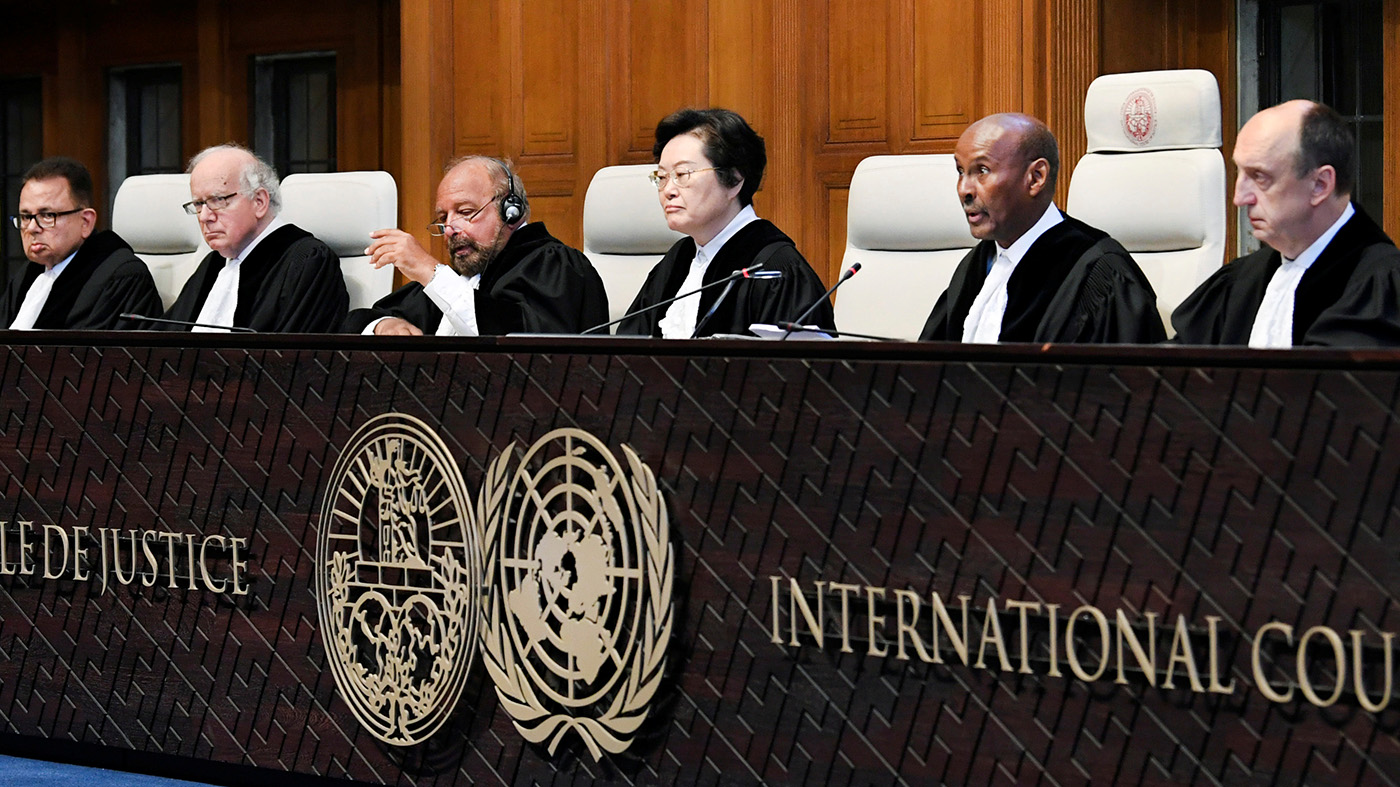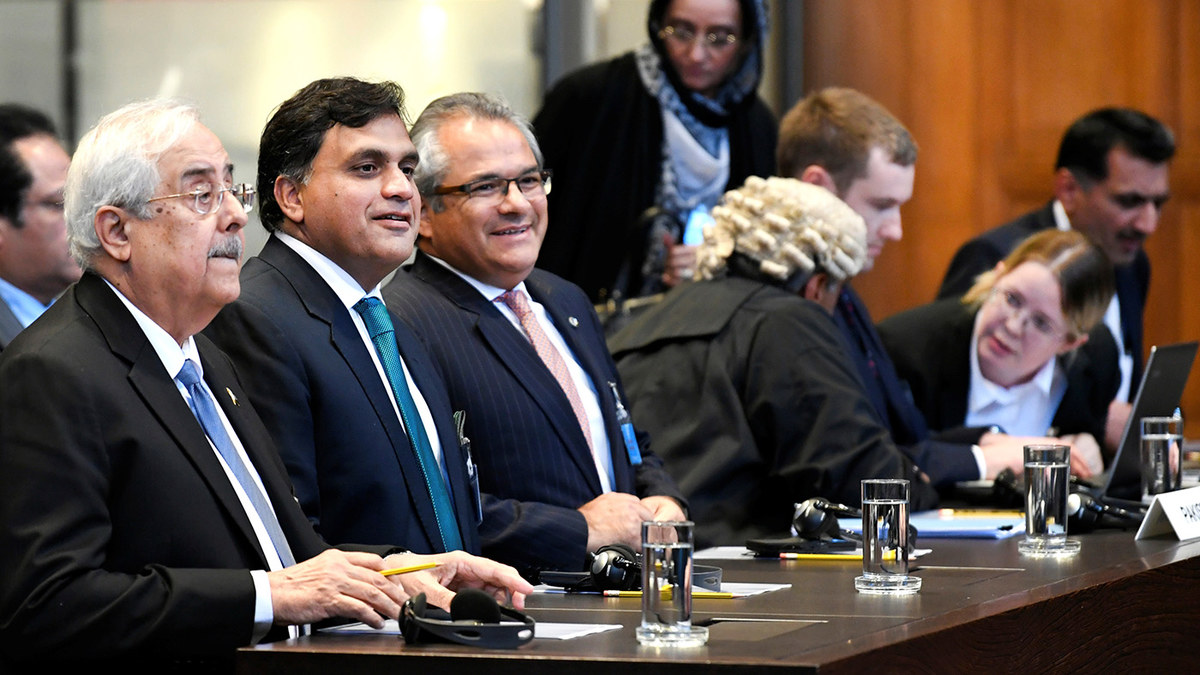ISLAMABAD/NEW DELHI: The World Court on Wednesday ordered Pakistan to review a 2017 military court verdict to execute an Indian naval officer convicted of espionage, the latest development in a high-profile case that has further strained relations between arch foes and nuclear-armed neighbors India and Pakistan.
The case revolves around the fate of Kulbhushan Sudhir Jadhav, arrested by Pakistan in 2016 after allegedly entering the country from Iran, and accused of fomenting “terrorist activities” in the restive southwest province of Baluchistan.
Pakistani authorities have pointed to Jadhav’s arrest as evidence of India’s involvement in militancy in the volatile province where the Pakistan military is fighting a long-running separatist insurgency. India denies Jadhav is a spy and brought his case before the International Court of Justice (ICJ), the top United Nations legal body for hearing disputes between states, arguing that the Indian citizen had been given an unfair trial and denied diplomatic assistance by Islamabad.

Judges are seen at the International Court of Justice before the issue of a verdict in the case of Indian national Kulbhushan Jadhav who was sentenced to death by Pakistan in 2017, in The Hague, Netherlands July 17, 2019. (REUTERS)
In May 2017, the ICJ had ordered Pakistan to stay the execution of Jadhav until the 11-member court gave its final decision. Pakistan and India regularly convict each other’s citizens of espionage but executions are rare.
In a fresh ruling on Thursday, the ICJ ordered Pakistan to review and reconsider the conviction and sentence of Jadhav “by the means of its own choosing … so as to ensure that full weight is given to the effect of the violation of the rights set forth in Article 36 of the Convention.”
The decision was fifteen votes to one, with ad hoc judge Tassaduq Hussain Jillani from Pakistan delivering the dissenting vote.
The court also ordered Pakistan to grant India consular access to Jadhav, saying Islamabad had deprived India of the right to communicate with and have access to the convict, to visit him in detention and arrange for his legal representation. The court also ruled that Islamabad had breached its obligations under the Vienna Convention on Consular Relations by not notifying the appropriate Indian consular post in Pakistan of Jadhav’s detention, “thereby depriving the Republic of India of the right to render the assistance provided for by the Vienna Convention to the individual concerned.”
“The Islamic Republic of Pakistan is under an obligation to inform Mr. Kulbhushan Sudhir Jadhav without further delay of his rights and to provide Indian consular officers access to him in accordance with Article 36 of the Vienna Convention on Consular Relations,” the court said.
Indian Prime Minister Narendra Modi welcomed the verdict in a tweet.
“Truth and justice have prevailed. Congratulations to the ICJ for a verdict based on extensive study of facts,” Modi said. “I am sure Kulbhushan Jadhav will get justice.”
The Indian foreign ministry also appreciated the judgment, saying the court had upheld India’s claim that Pakistan had violated the Vienna Convention and “should review and reconsider the conviction and sentence given to Jadhav by the Pakistani military court.”
In a video recorded by Pakistani authorities, Jadhav was heard confessing to being assigned by India’s intelligence service to plan, coordinate and organize espionage and sabotage activities in Balochistan “aiming to destabilize and wage war against Pakistan.”
India then asked the ICJ for the injunction barring Pakistan from executing Jadhav.
Pakistan has maintained that the ICJ need not intervene in the case as the Vienna convention on consular relations did not apply to “spies and terrorists,” and also that a 2008 bilateral treaty with India, that Pakistan says supersedes the Vienna pact, allowed the right to consular access to be waived where “national security” was at risk. Islamabad has also noted that Jadhav’s sentence was subject to appeal and he was in no immediate danger of execution.
“Commander Jadhav shall remain in Pakistan. He shall be treated in accordance with the laws of Pakistan,” Pakistani foreign minister Shah Mahmood Qureshi said in a Twitter post shortly after the ICJ’s ruling. “This is a victory for Pakistan.”
Reema Omar, a legal adviser to the International Commission of Jurists, said the ICJ had no history of acquitting convicts in such cases, or giving safe passage or other reliefs that India had sought from the court.
“It was always very obvious that this would not be possible under international law and ICJ jurisdiction, so those reliefs were rejected,” she told Arab News. “An adequate reparation would be an effective review and reconsideration of the sentence, which is what the ICJ has ordered.”
Contrary to narratives spun by the Pakistani government and media, the Jadhav case, Omar said, “was never about whether he was a spy, if he was involved in terrorism activities, whether Pakistan convicted him correctly or whether he should have been given the death sentence.”
The case had a very specific legal question as its basis,” Omar said, “which is whether Jhadav was entitled to consular access and notification under the Vienna Convention on consular access.”
“Pakistan’s argument was that because he is a spy and a terrorist, this right was not applicable to him. But this was always going to be a weak ground because this right applies from the moment you are arrested, because to begin with there is an allegation against you which needs to be proven,; how can you be denied consular access when a charge has not yet been proved?” Omar said.
She added that Pakistan’s argument that a 2008 bilateral treaty between Pakistan and India waived the right to consular access if national security was involved was rejected by the court on Thursday because under settled principles of international law, bilateral treaties could amplify or add to the rights granted in multilateral treaties, but they could not deny or reject those rights.
“In terms of merit, India has won the case and the court has accepted India’s argument that Pakistan breached the Vienna convention on consular access,” she said.

Attorney-General for Pakistan Anwar Mansoor, Foreign Office spokesperson Mohammad Faisal and Shujjat Ali Rathore, Ambassador of Pakistan in the Netherlands, seen before a verdict in the case of Indian national Kulbhushan Jadhav by International Court of Justice, in The Hague, Netherlands, July 17, 2019. (REUTERS)
Now the question, as per the court’s judgment, is whether the decision to sentence Jadhav to death would have been different had he been given consular access during his trial; hence, the court’s order that the death sentence be reviewed. The court did not specify who would review the judgment and left it up to Pakistani authorities, but legal experts say the high courts and the supreme court would be the right forums to take up the case for reconsideration.
“If Pakistan delivers on the judgment, then it will open diplomatic space for both India and Pakistan to engage each other,” said Harsh V Pant of the Observer Research Foundation, a New Delhi based think tank, calling the judgment “a big diplomatic victory.
Pakistan has repeatedly described India’s decision to take its case to the UN court as “political theater.”
The Vienna Convention has been a frequent subject of disputes at the ICJ, often in cases involving the United States. The ICJ’s rulings are binding though occasionally flouted, such as in 1999 when US authorities ignored an ICJ injunction and executed a German national.
















